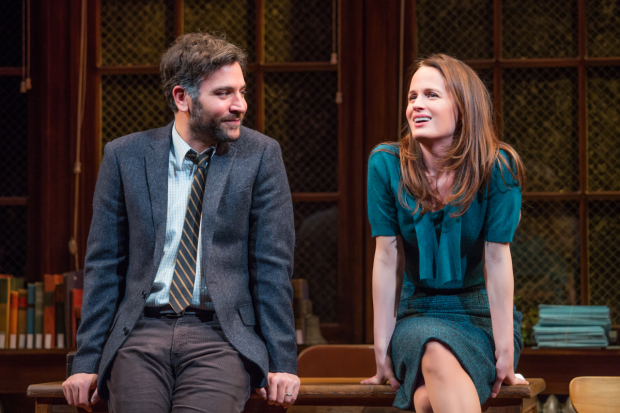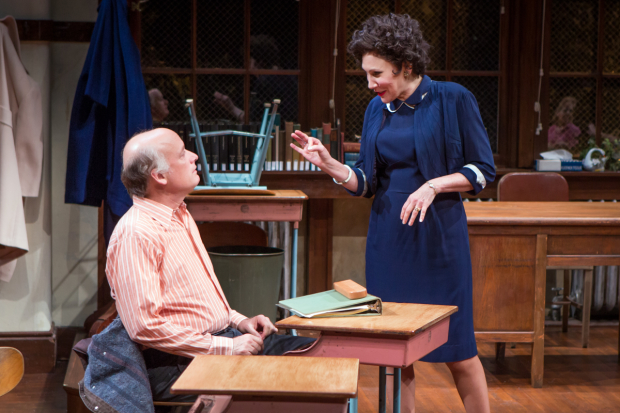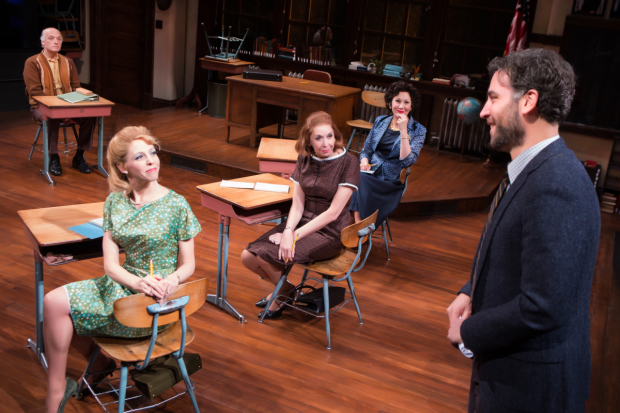
(© Jeremy Daniel)
Richard Greenberg begins his latest play at The End. Those famous last words constitute the first line of The Babylon Line, his captivating new work at Lincoln Center Theater. Greenberg (The Assembled Parties) is clearly interested in endings, and he gives us a grand one in this thoughtful and sympathetic drama; but he has to line up a lot of dominoes before he can knock them down.
Outside a narrative frame of 2015, the story takes place in 1967: Struggling author Aaron Port (Josh Radnor) takes the Long Island Rail Road from Manhattan to Levittown every week to teach an adult-education course on creative writing. Despite the vision of uniform beige houses Levittown conjures, it offers a surprisingly dramatic setting to this classroom drama if we consider it the prototype of a utopian social experiment (which the American suburbs undeniably are). Playing the role of chief revolutionary and grand inquisitor is Frieda Cohen (Randy Graff), a type-A busybody who asserts her dominance over her classmates and instructor from day one.
"We read, he says two syllables, we talk – forgive me," she remarks about Aaron's hands-off prompt-free method of teaching, "I didn’t know I’d be studying with a Freudian." Through Graff’s unfailingly cheerful delivery, Frieda's barbs cut like a razor blade hidden in a gelatin mold. Frieda has found her domestic salvation in Levittown and will fight to the death in defense of the faith. Violent and uncouth literary subjects will not be tolerated.

(© Jeremy Daniel)
The other students are less fervent in their embrace of the suburban year zero: Jack Hassenpflug (a somewhat askew Frank Wood) is a World War II veteran who uses the class therapeutically, as a way to discuss long suppressed memories of combat. Midge Braverman (a very funny Julie Halston) recalls the radicalism she and her husband abandoned before joining the Levittown revolution. A crossover character from Greenberg's last play, Our Mother's Brief Affair, Anna Cantor (a guarded Maddie Corman) flimsily disguises her domestic problems in a showoff essay about a family trip to Europe.
Most mysterious is Joan Dellamond (Elizabeth Reaser), a recluse who retreated into her cookie cutter house one day and didn't emerge for seven years. Monk-like, she spent that time reading great literature, which has given her a keen sense of the power of the written word. The other students look forward to the class for her shocking prose far more than Aaron's nonexistent instruction.
With a breathy delivery that suggests a world-weary Southern belle, Reaser portrays a desperate housewife who has decided to play the role of Long Island femme fatale. She disarms Aaron with her perceptive observations about his unfulfilled life in an attempt to lead him into temptation.
Sporting a messy crop of salt-and-pepper hair, Radnor looks and sounds like a middle-aged writer-cum-teacher: His disdain for his students and their lifestyle is barely sheathed out of financial prudence: "Look hard at your lives and I'm sure you'll find something grotesque to write about," he shouts when they complain of his lack of a prompt. He then quickly pulls back from the brink.
Director Terry Kinney crafts these potentially explosive moments with care and restraint, allowing the tension in the room to build slowly and surely until we are fully invested. Richard Hoover's hardwood set is an unassuming backdrop for social combustion: Black and white presidential portraits stare out over a neat row of desks. David Weiner's atmospheric lighting shines through large upstage windows, which frame a beautiful snowfall during a blizzard. The institutional lighting of the classroom dims to something more intimate and focused when the students read their work: It takes us to another place as the other actors seamlessly jump into new roles within these stories, helping us to get to know the specific circumstances around their lives, all of which are dynamic, layered, and incredibly real.

(© Jeremy Daniel)
Greenberg is a playwright who obviously loves his characters, so much so that he gives the play a 20-minute epilogue that traces each of the students over the following 50 years. The endings are surprising, delightful, and mostly happy, which somewhat undermines the stakes of the central story. The moment the class ends has the potential to seem irreconcilably sad, especially for Joan. But then life goes on, as it often does. Greenberg sacrifices the tragedy of the moment for the comedy of the long perspective — and we are grateful to him for it.









